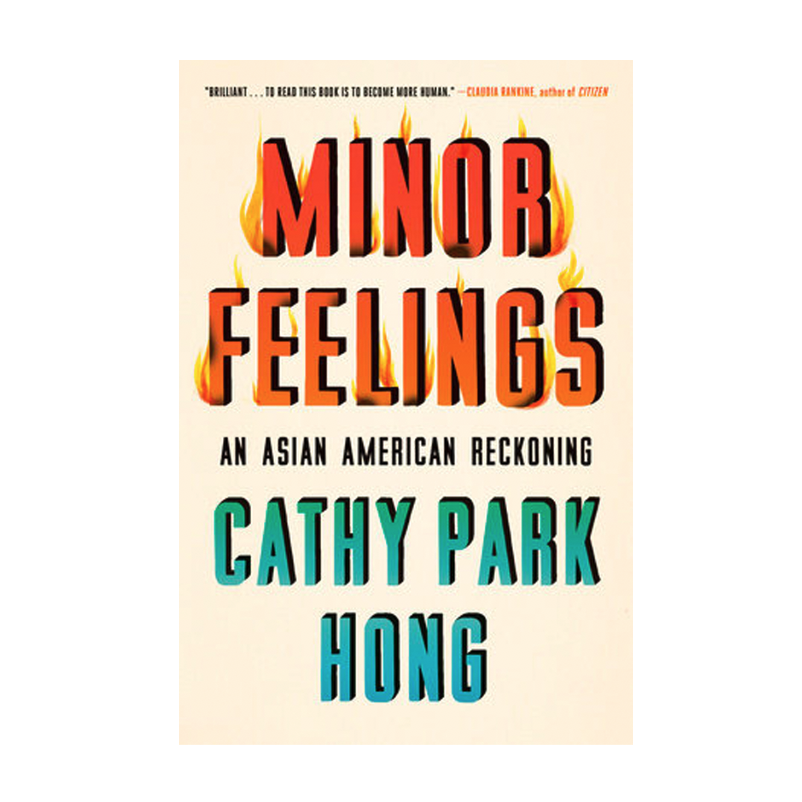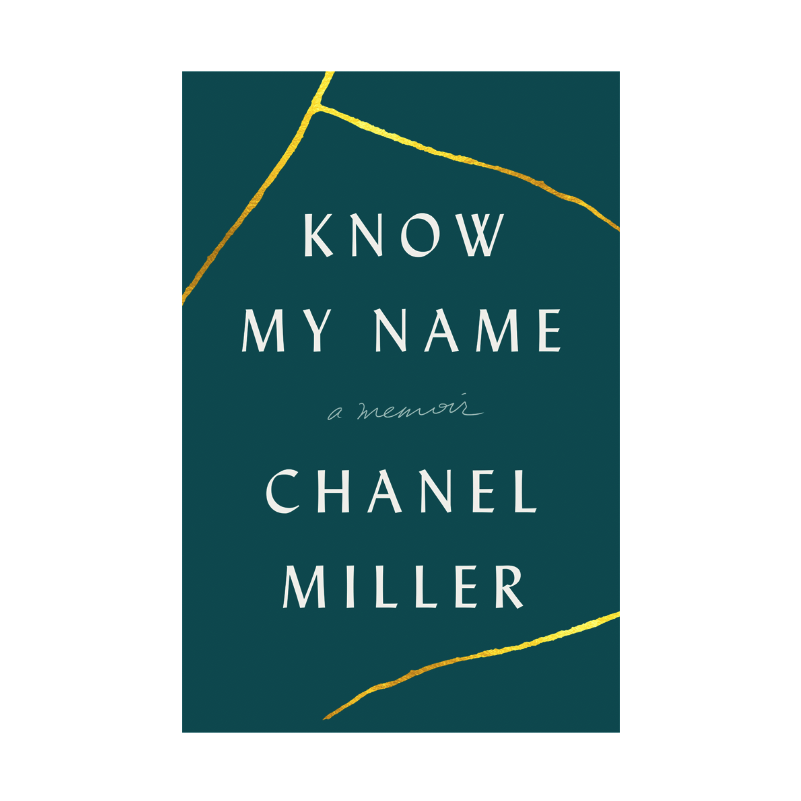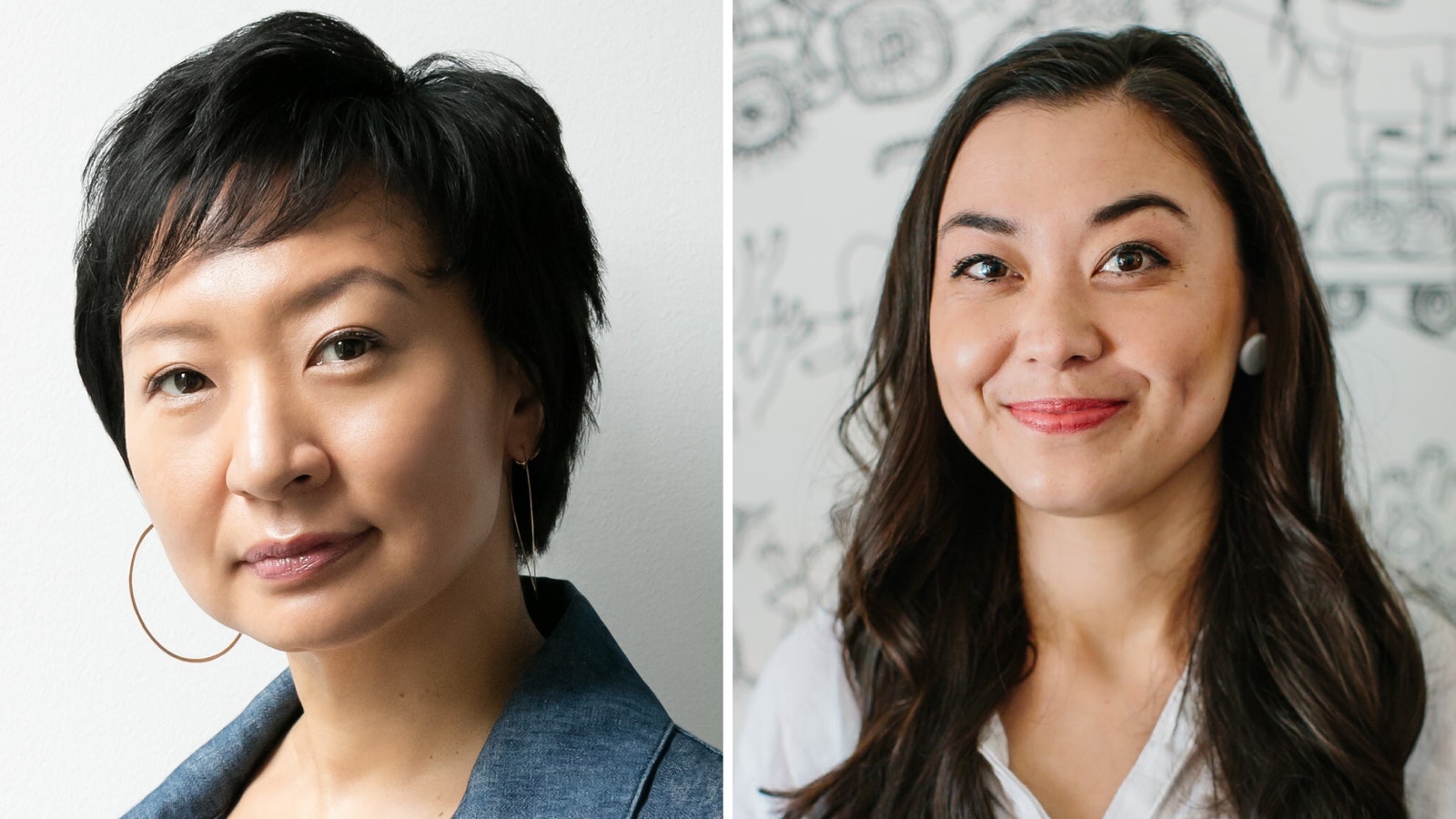“What I’m seeing is this outpouring of rage and grief and activism from Asian Americans that is unprecedented.”

Cathy Park Hong and Chanel Miller on Making Art Out of Grief: A Conversation
In her book Minor Feelings: An Asian American Reckoning, the poet Cathy Park Hong explains the pleasures of what she calls “bad English.” Her ode is a celebration of the profane, the borrowed, the “short, barbed, and broken.” It is also an acknowledgment—that English is a limited language, that it can't capture the full spectrum of emotions the people who speak it or who are forced to speak it feel.
The silences in language—the spaces between what happened and the inadequate words we have to describe it—is an obsession that Hong shares with Chanel Miller. Miller is an artist, writer, and the author of Know My Name, the best-selling memoir published in 2019. The book details her sexual assault and the court case that followed, which drew national attention after the victim impact statement that Miller read at the time of her assailant's sentencing went viral.
“Minor Feelings” by Cathy Park Hong
"Know My Name" by Chanel Miller
$16.56BookshopBoth Hong and Miller grapple in their work with the tensions and beauties inherent in overlapping identities—woman, Asian, artist, survivor. And so as Hong prepared for the paperback release of Minor Feelings and amid a national spike in hate crimes against Asian American communities, Glamour invited the two women to have a wide-ranging conversation about voice, creative expression, and writing as a defiant act. Then, less than 72 hours before their scheduled sit-down, a shooter killed eight people, including six Asian women, in a targeted, racist attack. The Atlanta massacre sparked not just massive outrage and protests, but also a national explosion of grief among Asian Americans and allies.
It was in that context that Hong and Miller met (over Zoom) at last to talk about their heartbreak, of course, but also power, confidence, and the importance of telling our stories in our own words.
Chanel Miller: So I read Minor Feelings right when COVID hit. I’ve been thinking a lot about how you’ve been asked since then about Asian American reckoning and what that reckoning is. You’ve talked about how it’s a process, a constant confrontation with the Asian American condition. You have all of these scenes and influential figures that are distinct in the book and that seem unrelated, but collectively they’re so cohesive and brilliant. You have a childhood in Koreatown, but you also have Richard Pryor unpeeling shame onstage. You have Theresa Hak Kyung Cha, the poet. You restore her after her brutal erasure.
The question I have now is about that process. Right now, reading the news, I’ve been experiencing this minefield of memories—a constant barrage of resurfacing memories that I haven’t sat down to think of in a while. Memories of self-loathing, silencing, self-questioning. I am being bombarded with all these scenes that I have not figured out how to connect. I have a Word document that just is titled “Asian,” and I just pour into it.
When you set out to do this book and to tell these stories, what did your first drafts look like? Were you surprised by the influence of certain figures in your life or the significance of certain memories that you didn't know were so pivotal? I just want to hear some guidance on how we begin to document as we make sense of the news through a personal lens.
Cathy Park Hong: Oh my God, I’m so glad you brought all of this up. The answer is I don’t know. I was kind of dragged kicking and screaming to the Asian American subject. It’s always been one of my core interests, but I’d never tackled it directly. At a certain point I realized that I had to; I wanted to deal with race, but I kept deflecting from confronting my Asian American identity. The book was supposed to be about race, poetry, and institutional racism in art. But as I kept writing, I was thinking there’s a huge gap—a huge, meteor-sized-hole in this discourse when it comes to Asian Americans. I had to jump in and see what I could find.
AdvertisementIt takes so much revision to get to the core of who you are and to arrive at those vulnerable moments. I wrote a lot. I knew I wasn’t the kind of scholar who was going to produce a whole compendium on Asian American history. I could only write piecemeal, and I could only write it from my perspective. I’m a poet. I’ve always been a fragmentary writer. I was like, You know what? My Asian American experience is becoming obsessed with Richard Pryor. It’s not, like, getting a jade necklace for my mom.
I had a similar question for you, actually, and I can’t help but tie this conversation to the headlines that are swirling around us right now. When the police captain in Atlanta said that the alleged shooter was having a “bad day,” it reminded me of your book. You were able to perfectly, poetically say how the legal system and the police system is not built to protect the vulnerable or to protect women, but to protect the powerful. It made me wonder what’s been going through your mind. Clearly, you’ve been thinking through this.
Chanel: Yeah. I remember right after the sentencing, the judge said he knew certain parties would be unhappy. I took it to mean that he knew I would be upset, that my family wouldn’t be satisfied. But in the end that didn’t matter. My anger didn’t amount to a threat. It would never have influenced his decision because my being upset had no power.
My assailant had 40 letters submitted on his behalf to the judge, explaining why he mattered to his community, why his character was strong, why he should be given a chance. I started to feel like he had this gravitational pull. Even though we were in court, he was still so tethered to his community, and it was as if he was being pulled out temporarily, but he was going to be snapped back and returned to that cushioned environment. I was this thing that was adrift, that sort of floated in and had come from nothing and would return to nothing. The force around him—who he was and what he needed to be and how important it was to return him to his origin state—was so strong, and I felt just so weak against that until the statement went viral.
I’ve seen you talk a lot about being underestimated. I feel like I thrive off it. And maybe it’s even helped that I was underestimated because people just don’t see it coming. They didn’t see that I was observing or that I did have the language for what was happening. I don’t know if you realize how much you’ve done or how much language you’ve provided with this book, but it’s really been such an infrastructure for me.
AdvertisementCathy: You made so many points I want to come back to. First, thank you. I wrote the book out of desperation because I had to name these terms for myself in order to give myself permission to feel them. Second, it’s funny what you say about being underestimated because I totally relate to that as well. It’s kind of like a pool-shark move. It’s just people saying you can’t really write or you can’t really speak up. So when their guard is down, you cut them in the jugular. It’s a total sneak attack. So as much as I complain about being underestimated, I use it to my advantage. It’s such a stealth move.
But it also fucking sucks being underestimated constantly because it’s exhausting. I felt that in my body reading your book too. Not to pump us up or anything, but what a gift that you have as a writer or that I might have as an Asian writing about the Asian American experience—to use our craft so that the reader is inhabited in our bodies. I didn’t want to just say, “I was invisible.” I wanted to capture what that felt like. And that’s also why I think your statement blew up. There have been so many testimonials before yours, but you had that precision, that empathy. You were able to show your agency.
And that is so important now. This news is horrifying but what I’m seeing is this outpouring of rage and grief and activism from Asian Americans that is unprecedented. I don’t think I’ve ever witnessed this before, right. Do you feel that way?
Chanel: I do. I feel that. It’s so charged right now. And it feels like the first time it’s happening for all of us at once. With my Asian Americans friends, old experiences will surface, microaggressions you’ve endured will come up. It’s always somewhere in the conversation, but it’s never been the center.
Cathy: I feel weirdly protective of that outpouring of rage and grief and activism and this hunger to tell all the different stories because I’m afraid. I’m afraid this country will move on. And I want to hold that space and I want to say, “No, we’re not just a passing spectacle.”
Chanel: I think that’s what I’m dreading. I’m not prepared for the heartbreak of feeling lodged in something and watching the rest of the world move on from it. I remember before one of my court dates, I was nervous about the potential media attention. I didn’t want it to cause a fuss. I didn’t want to be exposed. And I just remember someone said, “Don’t worry. It’s happening around the time of the Super Bowl, so it’ll barely register.” I felt this relief, but also sadness. Like, “Oh, don’t worry. The Super Bowl will be so much bigger. It’s this huge shadow, and you’ll just be a blip.”
AdvertisementI know that prior to your book release you were worried that no one would care about the book. But your book came out, and then that fear was proved wrong. The book has done well, and it has been celebrated. The same thing happened with mine. I feel grateful for the success of it, but even now I’ll still do events and I’ll feel surprised when people arrive. I’ll win an award and feel surprised. My confidence still feels slippery. We’ve both had success now. Do you feel like you are on more solid ground? Can you trust yourself or will we always be working to tamp down that fear?
Cathy: Oh, I think writers by nature tend to be neurotic. It’s our profession, but I would also say for myself I think there’s something about growing up Korean, growing up as a woman too—it’s inculcated in me to be hard on myself. I’m Asian American, which is an ethnicity that no one cares about, and I’m also writing poetry, which no one cares about. That’s going to double the self-loathing! And it’s hard to release yourself from it. I’m still waiting for that day when I feel completely confident, but at the same time, I’m 44 now. You’re incredibly self-possessed. I think I was just this bottomless pit of yearning and insecurity when I was 28. I’m much more comfortable in my skin and much less tolerant of other people’s bullshit than I was when I was in my 20s. So it does get easier as you get older.
Chanel: Good, that’s what I wanted to hear.
Cathy: There’s a reason why people write memoirs when they’re older, because you usually need that kind of assuredness or wisdom. You do not have to be an old person to have that, though; you’ve shown that. There’s so much wisdom in your book. How did you learn how to write such a masterful memoir?
Chanel: You’re so kind. Well, again, it comes back to this idea that the story had already been told so many times and it never felt right. I think what disturbed me most throughout the case was watching how fogged up my brain became and how I began to believe that I did deserve what happened, that I didn’t have anything to say. Eventually I snapped out of it because I saw the same degradation happening to my sister, and I knew I needed to put a stop to that. That woke me up and helped burn away some of the fear and self-consciousness. I feel like once you see violence and you see how it lives in our day-to-day lives, you can’t unsee it. I knew that until I could point it out to other people, I wouldn’t be able to feel sane.
Cathy: Your book was very moving to me in part because of your relationship with your family. I’m an older sister too, so I definitely understood the protectiveness that you felt for your younger sister. I was also really intrigued by your relationship with your mother, and I wanted to ask if you could talk about that more. She seems like a fascinating person because she’s a writer too. Did her being a writer inspire you as a writer?
Chanel: My mom is a fearless person, and it’s so hard because she was a writer in China and then she came here. I remember finding worksheets when she started taking English classes, and they’d say, “I’m hungry,” “I’m sad.” I just could not believe that my mom—whose internal life is so rich with this landscape that is so strange and vast—was being reduced to that. She’s such a giver of stories. In high school I would sit down and type them out for her, and whenever I typed them, I would always type it exactly how she spoke it. I never liked correcting it. I didn’t want to fix the grammar because that’s her voice to me. If I wrote it in “perfect” sentences, it wouldn’t feel like she’s telling me her story.
AdvertisementBut I’ve always been very aware of my role, translating America or helping her in some way. I am aware of the fact that she gave up a language she was fluent in to be here, and so I am determined to make use of language in the most powerful way that I can.
Cathy: To be a Chinese writer and then to come to a country and have to fit yourself into a whole new language—it must be extra painful. Do you speak Chinese?
Chanel: I spoke it more when I was young. But I took Chinese in college. I have two lessons a week on Zoom now too. So I’ve been seeking it out. There’s also the fact that my mom’s dialect is different, so she even felt self-conscious just speaking Mandarin.
Cathy: Wow.
Chanel: Right. It’s not just Chinese or no Chinese. It’s so nuanced.
Cathy: I’m trying to get stories from my mom, and she speaks Korean, but my Korean has gotten so bad. I always think, How much am I missing? How much am I missing because of the language barrier? And also I wonder how much am I missing in terms of what she refuses to reveal about herself? I did a talk once, and there was this young Asian American woman who asked about how we go about retrieving our histories or personal stories if our elders refuse to talk? It’s tough, you know. A lot of immigrants come here to forget.
Chanel: I think you’re right. But I think we’re all plotting a little bit now about how to do that.
Cathy: I guess I’m also thinking about the victims and the witnesses of this tragic event. Will we ever get their stories? I don’t know about them at all, except for the most superficial details. “She was a single mother. She was loving.”
Chanel: It’s surface level.
Cathy: It’s all surface level. Will we ever get to know the deep well of pain and joy of their lives? Even if there are cameras on that spa right now, and there are swarms of reporters, will we ever really get their stories? In some ways it seems so inaccessible.
Chanel: Totally. I am so haunted by that untouched depth. Does it just disappear with them, or can we, as younger people, seek to preserve not just their stories, but the stories of our elders? I think there is a feeling of urgency to do that, confusion about how to do that, sadness if we’re not able to do that. That’s very real.
Cathy: It is very real, and I feel this need to protect them because they’re our mothers. It’s our mothers who are being spat on and it’s our mothers who are being humiliated on the streets. These are our mothers and grandmothers.
Chanel: Yeah, absolutely. And the work is ongoing, right? And we don’t even need to provide a neat ending because that’s not what we’re here for.
Mattie Kahn is the culture director of Glamour.
This story originally appeared on: Glamour - Author:Mattie Kahn






























